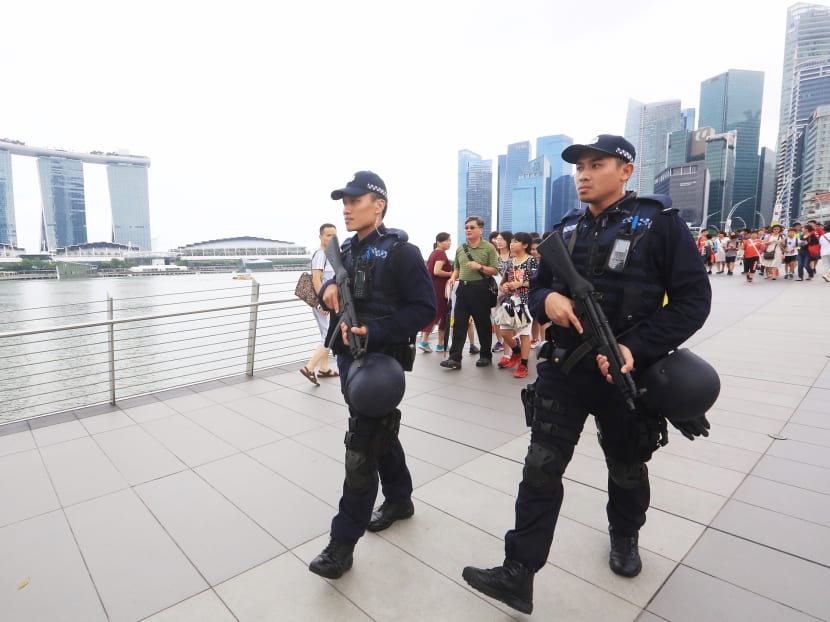Tougher security to be required for major events
SINGAPORE — New laws will be introduced to guard against security threats, with the Public Order Act to be amended to require that events with large crowds and those that are of higher-risk put in place security measures.
SINGAPORE — New laws will be introduced to guard against security threats, with the Public Order Act to be amended to require that events with large crowds and those that are of higher-risk put in place security measures.
A new Infrastructure Protection Act will also be introduced, with Senior Minister of State for Home Affairs Desmond Lee noting that businesses have an important role to play in Singapore’s security, and calling the proposed measures part of the shared effort to keep Singapore safe.
The amendments to the Public Order Act will see the police work with event organisers on the security measures, which will be calibrated based on the assessed risk to the event, said the Ministry of Home Affairs in response to queries.
The Infrastructure Protection Act will entail a framework that ensures selected buildings have enough security measures to guard against threats. The MHA said that, currently, critical infrastructure undergoes a security review process at the design stage, and the necessary security measures are then incorporated into the design and construction of the building.
“A similar review would be required for new, large-scale commercial developments. The Act may also require building owners to adopt additional protective measures in the event of heightened threats, such as implementing bag checks,” said an MHA spokesman. No details were available on the timeline for implementing the changes.
In imposing these legislations, Mr Lee, who was speaking during the debate on the Ministry for Home Affairs’ (MHA) Budget in Parliament on Friday (March 3), said that the Government is mindful of the potential impact on businesses, adding that it will take a practical approach to keep the cost of such measures reasonable.
Terrorism has imposed a cost on society as a whole, a significant share of which has been borne by the Government, while communities have been roped in to play a part through SGSecure, a national movement that seeks to prepare the public for terror attacks.
“We seek the business community’s understanding that these measures are necessary as a shared effort to keep Singapore and Singaporeans safe,” Mr Lee said.
Several Members of Parliament (MPs) spoke on the terror threat during the debate, with Mr Christopher De Souza (Holland-Bukit Timah GRC) asking how MHA tracks overseas terror threats and isolates those that could potentially come from within Singapore. Others, such as Ms Rahayu Mahzam (Jurong GRC), asked for updates on SGSecure, and whether there are ways to measure the level of awareness and preparedness of the community.
In his speech, Home Affairs and Law Minister K Shanmugam shared efforts to bolster safety and security, noting that about 11,000 police cameras will be installed at 2,500 locations island-wide. Cameras have already been put up in all 10,000 Housing and Development Board (HDB) blocks and multi-storey carparks under the PolCam 1.0 initiative, first rolled out in April 2012.
And to beef up frontline response capabilities, the police plan to equip officers with pistols, with Mr Shanmugam saying that pistols — which can carry up to three times more ammunition — will give officers better firepower compared with the revolvers that are currently used.
Asked by Mr Patrick Tay (West Coast GRC) on whether pistols will also be given to auxiliary police officers (APOs), Mr Shanmugam said for the time being, this measure is meant for police officers.
Ms Sylvia Lim (Aljunied GRC) raised concerns over foreign APOs bearing arms, asking whether there are risk-mitigation measures and whether the authorities would consider giving them stun guns instead.
In response, Mr Lee noted that while there have been isolated cases of both local and foreign APOs misusing their weapons, there is a need for officers to be armed so they can carry out their tasks and protect Singapore’s infrastructure. “Not doing so may compromise our security even more. And we have to recognise and manage the risks through screening, training and supervision, whether it is an APO of Singaporean or foreign origin who is equipped with arms,” said Mr Lee.







